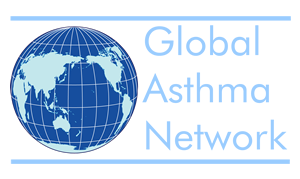

The Global Asthma Network emerged from the success of the International Study of Asthma and Allergies (ISAAC) programme which began in March 1991, whereby pre-existing multinational collaborative projects from Auckland, New Zealand and Bochum, Germany, each investigating variations in childhood asthma at the population level joined to form ISAAC.
The Global Asthma Network (http://www.globalasthmanetwork.org) was established in 2012 to identify and address the problem of asthma which is an important Non-Communicable Disease (NCD) globally. The Global Asthma Network evolved from ISAAC and the International Union Against Tuberculosis and Lung Disease (The Union), two organisations dedicated to helping countries identify and address this important NCD for more than two decades, and from the Global Asthma Report 2011. The 2011 report was timed to coincide with the United Nations High-Level Meeting on NCDs, which took place in New York on 19–20 September 2011. Subsequently the Global Asthma Network published the Global Asthma Report 2014. It was launched at the 45th Union World Conference on Lung Health, Barcelona, Spain, 28 October to 1 November 2014. The Global Asthma Network Steering Group is named in section 21 of this manual.
The Global Asthma Network aims to progress from these reports and engage government’s health ministers, policy-makers, health workers, people living with asthma, development partners, donors and media in efforts to improve asthma care globally. Core activities of the Global Asthma Network are: global surveillance; promotion and backing of standard case management of asthma; operational research; capacity building; engagement with policy-makers; and access to affordable quality-assured medicines. Contact details, for the Global Asthma Network Steering Group, can be found in section 21.
Conduct asthma surveillance around the world and produce and disseminate surveillance data to achieve global recognition of the burden of asthma, especially the burden in low- and middle-income countries.
Promote effective, efficient, appropriate, affordable and accessible asthma management and care to reduce the rates of death, disability and suffering caused by asthma.
Research, develop and share evidence, success stories and practical tools that enable countries to improve and expand asthma management and prevention activities, organise the care of asthma patients to cover their whole populations.
Stimulate capacity-building in surveillance, health education and asthma standard case management and research in asthma, especially in low- and middle-income countries.
Ensure quality-assured essential asthma medicines are available and affordable in all countries - promotes a quality improvement package for the diagnosis, treatment and management of asthma.
Raise the profile of asthma and chronic airflow limitation on national multilateral and global agendas and empower other organisations to do the same.
A world where no-one suffers from asthma.
To prevent asthma and improve asthma care globally, with a focus on low and middle income countries. The network will achieve this through enhanced surveillance, research, capacity building, and access to effective asthma care including quality assured essential medicines.
A. Decrease severe asthma by 50% by 2025 by reducing the following by 50%
B. Increase the access to quality-assured essential asthma medicines by 2018 by undertaking the following:

Note: This manual has been updated as of 10 September 2015. If you visited or downloaded the manual before this date, please replace it with this latest version.
Note: If the pdf opens in an internet browser rather than with Adobe Acrobat Reader, in some browsers some of the formatting may not display correctly - for example the boxes in section 20.1 may not show up. If you have difficulty viewing the pdf document in your browser, please right click the link above and choose "save link as" from the list of options. This will allow you to save the pdf to your computer and open it using Adobe Acrobat Reader.
Our network has been targeted by an email scam. If you receive any unusual requests for assistance from any of the steering group members, please ignore it.
These emails are a common scam that has also targeted many other organisations. Please note we will never make any request for financial assistance from our collaborators. If you have any questions please contact us at info@globalasthmanetwork.org